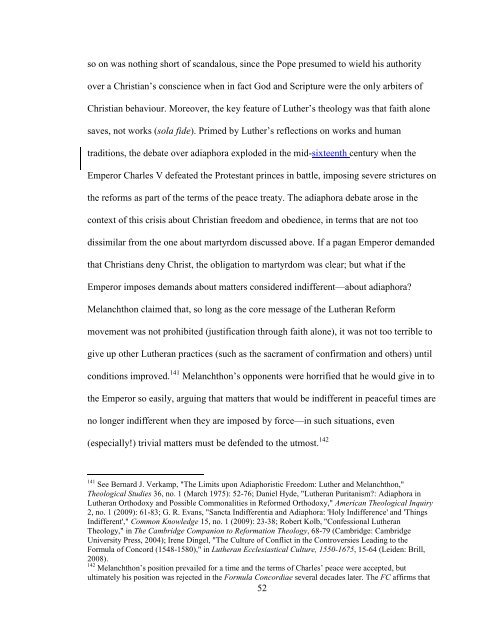the mystical theology of valentin weigel - DataSpace at Princeton ...
the mystical theology of valentin weigel - DataSpace at Princeton ...
the mystical theology of valentin weigel - DataSpace at Princeton ...
Create successful ePaper yourself
Turn your PDF publications into a flip-book with our unique Google optimized e-Paper software.
so on was nothing short <strong>of</strong> scandalous, since <strong>the</strong> Pope presumed to wield his authority<br />
over a Christian’s conscience when in fact God and Scripture were <strong>the</strong> only arbiters <strong>of</strong><br />
Christian behaviour. Moreover, <strong>the</strong> key fe<strong>at</strong>ure <strong>of</strong> Lu<strong>the</strong>r’s <strong>the</strong>ology was th<strong>at</strong> faith alone<br />
saves, not works (sola fide). Primed by Lu<strong>the</strong>r’s reflections on works and human<br />
traditions, <strong>the</strong> deb<strong>at</strong>e over adiaphora exploded in <strong>the</strong> mid-sixteenth century when <strong>the</strong><br />
Emperor Charles V defe<strong>at</strong>ed <strong>the</strong> Protestant princes in b<strong>at</strong>tle, imposing severe strictures on<br />
<strong>the</strong> reforms as part <strong>of</strong> <strong>the</strong> terms <strong>of</strong> <strong>the</strong> peace tre<strong>at</strong>y. The adiaphora deb<strong>at</strong>e arose in <strong>the</strong><br />
context <strong>of</strong> this crisis about Christian freedom and obedience, in terms th<strong>at</strong> are not too<br />
dissimilar from <strong>the</strong> one about martyrdom discussed above. If a pagan Emperor demanded<br />
th<strong>at</strong> Christians deny Christ, <strong>the</strong> oblig<strong>at</strong>ion to martyrdom was clear; but wh<strong>at</strong> if <strong>the</strong><br />
Emperor imposes demands about m<strong>at</strong>ters considered indifferent—about adiaphora?<br />
Melanchthon claimed th<strong>at</strong>, so long as <strong>the</strong> core message <strong>of</strong> <strong>the</strong> Lu<strong>the</strong>ran Reform<br />
movement was not prohibited (justific<strong>at</strong>ion through faith alone), it was not too terrible to<br />
give up o<strong>the</strong>r Lu<strong>the</strong>ran practices (such as <strong>the</strong> sacrament <strong>of</strong> confirm<strong>at</strong>ion and o<strong>the</strong>rs) until<br />
conditions improved. 141 Melanchthon’s opponents were horrified th<strong>at</strong> he would give in to<br />
<strong>the</strong> Emperor so easily, arguing th<strong>at</strong> m<strong>at</strong>ters th<strong>at</strong> would be indifferent in peaceful times are<br />
no longer indifferent when <strong>the</strong>y are imposed by force—in such situ<strong>at</strong>ions, even<br />
(especially!) trivial m<strong>at</strong>ters must be defended to <strong>the</strong> utmost. 142<br />
141 See Bernard J. Verkamp, "The Limits upon Adiaphoristic Freedom: Lu<strong>the</strong>r and Melanchthon,"<br />
Theological Studies 36, no. 1 (March 1975): 52-76; Daniel Hyde, "Lu<strong>the</strong>ran Puritanism?: Adiaphora in<br />
Lu<strong>the</strong>ran Orthodoxy and Possible Commonalities in Reformed Orthodoxy," American Theological Inquiry<br />
2, no. 1 (2009): 61-83; G. R. Evans, "Sancta Indifferentia and Adiaphora: 'Holy Indifference' and 'Things<br />
Indifferent'," Common Knowledge 15, no. 1 (2009): 23-38; Robert Kolb, "Confessional Lu<strong>the</strong>ran<br />
Theology," in The Cambridge Companion to Reform<strong>at</strong>ion Theology, 68-79 (Cambridge: Cambridge<br />
University Press, 2004); Irene Dingel, "The Culture <strong>of</strong> Conflict in <strong>the</strong> Controversies Leading to <strong>the</strong><br />
Formula <strong>of</strong> Concord (1548-1580)," in Lu<strong>the</strong>ran Ecclesiastical Culture, 1550-1675, 15-64 (Leiden: Brill,<br />
2008).<br />
142 Melanchthon’s position prevailed for a time and <strong>the</strong> terms <strong>of</strong> Charles’ peace were accepted, but<br />
ultim<strong>at</strong>ely his position was rejected in <strong>the</strong> Formula Concordiae several decades l<strong>at</strong>er. The FC affirms th<strong>at</strong><br />
52
















